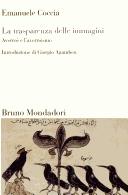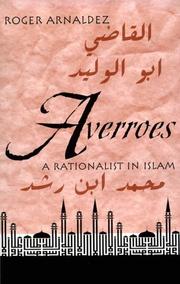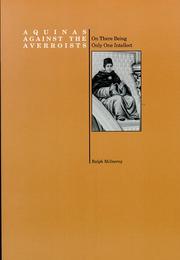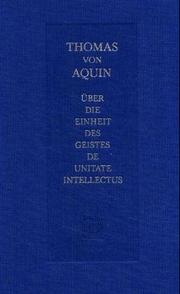| Listing 1 - 10 of 68 | << page >> |
Sort by
|
Book
ISBN: 9973150481 Year: 1998 Publisher: تونس المنظمة العربية للتربية والثقافة والعلوم
Abstract | Keywords | Export | Availability | Bookmark
 Loading...
Loading...Choose an application
- Reference Manager
- EndNote
- RefWorks (Direct export to RefWorks)
Book
ISBN: 9780192896117 Year: 2022 Publisher: New York : Oxford University Press,
Abstract | Keywords | Export | Availability | Bookmark
 Loading...
Loading...Choose an application
- Reference Manager
- EndNote
- RefWorks (Direct export to RefWorks)
Averroes on Intellect provides a detailed analysis of the Muslim philosopher Averroes (Ibn Rushd)'s notorious unicity thesis — the view that there is only one separate and eternal intellect for all human beings. It focuses directly on Averroes' arguments, both from the text of Aristotle's De Anima and, more importantly, his own philosophical arguments in the Long Commentary on the De Anima.Stephen Ogden defends Averroes' interpretation of De Anima using a combination of Greek, Arabic, Latin, and contemporary sources. Yet, Ogden also insists that Averroes is not merely a 'commentator' but an incisive philosopher in his own right. The author thus reconstructs and analyzes Averroes' two most significant independent philosophical arguments, the Determinate Particular Argument and the Unity Argument. Alternative ancient and medieval views are also considered throughout, especially from two important foils before and after Averroes, namely, Avicenna (Ibn Sina) and Thomas Aquinas. Aquinas' most famous and penetrating arguments against the unicity thesis are also addressed. Finally, Ogden considers Averroes' own objections to broader metaphysical views of the soul like Avicenna's and Aquinas', which agree with him on several key points including the immateriality of the intellect and the individuation of human souls by matter, while still diverging on the number and substantial nature of the intellect.The central goal of this book is to provide readers with a single study of Averroes' most pivotal arguments on intellect, consolidating and building on recent scholarship and offering a comprehensive case for his unicity thesis in the wider context of Aristotelian epistemology and metaphysics
Averroës, --- Intellect.
Book
ISBN: 9788893592314 8893592312 Year: 2018 Publisher: Roma Edizioni di Storia e Letteratura
Abstract | Keywords | Export | Availability | Bookmark
 Loading...
Loading...Choose an application
- Reference Manager
- EndNote
- RefWorks (Direct export to RefWorks)
Nel corso della sua lunga attività di insegnamento presso le Università di Padova e di Bologna, Pietro Pomponazzi si confrontò ripetutamente con il De anima di Aristotele e con il relativo commento di Averroè. Il suo primo corso svolto in qualità di professore ordinario a Padova risale al 1499, il frutto più maturo delle sue riflessioni è sicuramente il celebre Tractatus de immortalitate animae, pubblicato a Bologna nel 1516, che lo proiettò al centro di polemiche, discussioni e condanne. Gli studenti del Pomponazzi ci hanno tramandato gli appunti di numerosi suoi commenti al Corpus aristotelicum. Fra questi, di particolare interesse è l'esposizione sul primo libro del De anima, che il professore svolse a Padova sul cadere dell'anno 1503, e che fu riportata e messa in bella copia da un nobile veneziano, Antonio Surian, che frequentava le sue lezioni. Il volume presenta l'Expositio super I De anima secondo l'unico manoscritto che ci è pervenuto, conservato nella Biblioteca Nazionale di Napoli (VIII D 81), e reca un fondamentale contributo alla ricostruzione della formazione e dello sviluppo della dottrina psicologica pomponazziana.
Soul --- Aristotle. --- Averroës,

ISBN: 8842492728 Year: 2005 Publisher: Milano Mondadori
Abstract | Keywords | Export | Availability | Bookmark
 Loading...
Loading...Choose an application
- Reference Manager
- EndNote
- RefWorks (Direct export to RefWorks)
Book
ISBN: 9781648250118 1648250114 9781800104983 1800105150 Year: 2022 Publisher: Rochester, NY : University of Rochester Press,
Abstract | Keywords | Export | Availability | Bookmark
 Loading...
Loading...Choose an application
- Reference Manager
- EndNote
- RefWorks (Direct export to RefWorks)
The first collection of essays devoted to the Arabic philosopher Averroes's brilliant Commentary on Plato's "Republic," which survived the medieval period only in Hebrew and Latin translations.
Averroës, --- Plato. --- Averroës, --- Political science. --- Averroe¨s,

ISBN: 0268020086 Year: 2000 Publisher: Notre Dame University of Notre Dame press
Abstract | Keywords | Export | Availability | Bookmark
 Loading...
Loading...Choose an application
- Reference Manager
- EndNote
- RefWorks (Direct export to RefWorks)
Islamic philosophy --- Averroës, --- Religion.

ISBN: 1557530289 Year: 1993 Publisher: West Lafayette Purdue university press
Abstract | Keywords | Export | Availability | Bookmark
 Loading...
Loading...Choose an application
- Reference Manager
- EndNote
- RefWorks (Direct export to RefWorks)
Intellect --- Philosophy, Medieval --- Averroës, --- Thomas,
Book
ISBN: 8481644269 Year: 2001 Publisher: Madrid Trotta
Abstract | Keywords | Export | Availability | Bookmark
 Loading...
Loading...Choose an application
- Reference Manager
- EndNote
- RefWorks (Direct export to RefWorks)
Islamic philosophy --- Averroës, --- Criticism and interpretation.
Book
ISBN: 9788874626465 Year: 2013 Publisher: Macerata : Quodlibet
Abstract | Keywords | Export | Availability | Bookmark
 Loading...
Loading...Choose an application
- Reference Manager
- EndNote
- RefWorks (Direct export to RefWorks)
Averroës, --- Spinoza, Benedictus de, --- Influence. --- Sources.

ISBN: 3772508200 Year: 1987 Publisher: Stuttgart Freies Geistesleben
Abstract | Keywords | Export | Availability | Bookmark
 Loading...
Loading...Choose an application
- Reference Manager
- EndNote
- RefWorks (Direct export to RefWorks)
Intellect --- Spirit --- Early works to 1800 --- Averroës,
| Listing 1 - 10 of 68 | << page >> |
Sort by
|

 Search
Search Feedback
Feedback About UniCat
About UniCat  Help
Help News
News